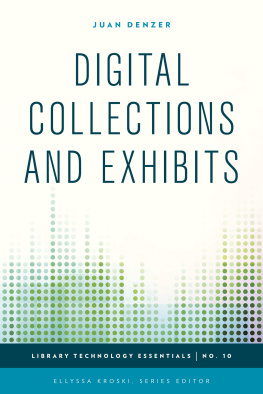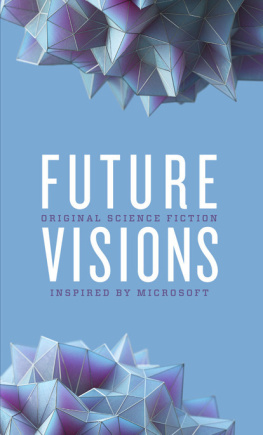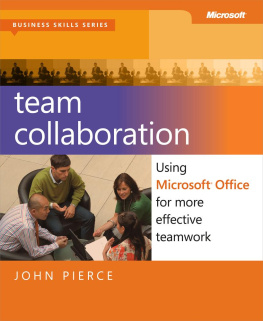Foreword
In this world of rapidand too often plannedobsolescence, where we seem to automatically equate smaller, bigger, faster, cheaper, higher resolution, and so on, with better, there is a certain value in stepping back from time to time and meditating on what words like better or progress actually mean to us. Not just as individuals although that is importantbut also as a family, culture, and society. As someone who loves old books but who also works in the world of digital technologies, I find it interesting that not only can I read a first edition of the journals of one of the explorers of Canada, but the experience of doing so is significantly better, and more intimate, than reading the same text on the most fancy new gadget. Not that there arent times when I welcome having the text on a digital device. Being able to search for a particular passage rather than having to rely on my faulty memory, or possibly an inadequate index, is something that I dont want to give up any more than my first edition. But in terms of the experience, the feel of the paper, the quality of the illustrations, and the visceral sense of connection to what I am reading about, there is no competition to the original book. I love, cherish, and regularly give thanks for the connection to the past that the technology from that earlier time offers me.
And to get closer to the point, I also realize that the nature and intensity of that connection would be even stronger if the book had been written by my ancestor, and even more so, had this copy been theirs. From such an example emerges a range of questions that should, but too seldom does, confront anyone designing or purchasing many of the new and improved technologies of today. The future of looking back , by Richard Banks, offers one of the most literate, thoughtful, and balanced explorations of such questions that I have encountered.
For example, some of my treasured books are well over 100 years old, yet they still function as well as they ever did. There is no dead battery, fried circuit board, or incompatible media that prevents me from picking up on the exact page from which some predecessor may have left off. Now think of the documents, videos, photos, recordings that you grew up withnot just yours, but those of your parents and their parents before them. Does it not seem ironic that chances are, the older the media, the longer they are likely to survive in a usable form? Sheet music from 200 years ago is as good now as it was when it was written. Can you say the same about your laser discs, 8-track tapes, favorite Atari video games, and CD-ROMs?
What Richard does is explore this space in such a way as to judge it in the court of human values, rather than technological specifications or market penetration. And yet, in so doing, he does not present us with a whining tome nostalgic for the good old days. His approach is both balanced and positive. This is no diatribe bemoaning how technology is destroying our culture. It is far more closely aligned to one of my favorite insights, articulated by the historian of technology, Melvyn Kranzberg:
Technology is neither good nor bad; nor is it neutral .
Essentially, Richards argument is that the future we get is the one that we design. If we ask the right questions and inform our decisions from a careful consideration of our true values, we can shape our technologies accordingly. Most appropriately, he makes his arguments around that most human of values and needs: weaving a thread of connectivity emotional, intellectual, and tangiblefrom our past, through our present, to our future.
Legacy is not just what we inherit from those who came before us but also what we leave to those who follow.
What I take from Richards book is a value statement that I find as provocative as it is insightful: the nature of legacy may well trump short-term coolness, in terms of long-term value. Furthermore, by asking the right questions at the right time, you may not need to pit one against the other.
Thanks to Richards book, we are far more likely to ask such questions in such a way. For that, we should thank himwe and those who would inherit the richer legacy that could result.
Bill Buxton Principal Researcher, Microsoft
Introduction
The way I see it weve been engaged in this long-term drama since the middle of the 19th century. Technologists provide tools that can improve peoples lives. But I want to be clear that I dont think technology by itself improves peoples lives, since often Im criticized for being too pro-technology. Unless theres commensurate ethical and moral improvements to go along with it, its for naught .
And so theres been, in my view, a social contract. As technologists create disruption, the new stuff we bring in is generally better than the old .
Jaron Lanier , The New York Times, May 25, 2011
Ive spent all of my career thinking about how people and technology meet, and most of it has been focused on designing and building tools. Until fairly recently the use of digital technology had a utilitarian emphasis that involved getting something done, as quickly and efficiently as possible. This wasnt a bad thing because it enabled us to find new ways of working and to achieve a great deal.
Now digital things have permeated other part of our lives, too. Through technology we listen to our favorite music wherever we are, record our world through our cameras, watch our world through digital video, and share all of thisand our thoughts about all of thiswith others through the Internet. The design of digital systems has shifted focus from building the best tools and toolbox possible to improving and extending the lives we live every day.
This is a book about the extension of the digital to our most human rites: remembering, reminiscing, reflecting, and honoring. It describes a profound shift in our use of digital technology, and it demandsa bit more strongly than Jaron Lanier does in the quote abovethat the new stuff we bring in is much better than the old.
Digital histories
Our daily experience of technology is contradictory. We (or at least geeks like me) are thrilled about and constantly expectant of the new possibilities enabled by our digital things. At the same time, those digital things that we have lived with for only a short period have quietly and subtly become mundane and commonplace. Technology now forms an everyday part of the background of our lives and of the world we live in. It has gone beyond being about novelty to impacting many aspects of what it means simply to be human.








